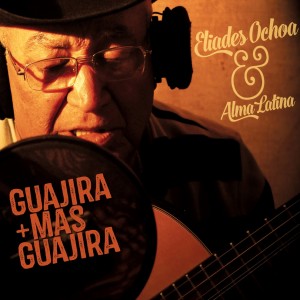 This is a very special recording for all lovers of Cuban music. Siblings Eliades and Maria Ochoa have teamed up for a showcase album of songs of romantic yearning and upbeat danceable numbers focused on the style known as guajira that is Cuba’s answer to country music.
This is a very special recording for all lovers of Cuban music. Siblings Eliades and Maria Ochoa have teamed up for a showcase album of songs of romantic yearning and upbeat danceable numbers focused on the style known as guajira that is Cuba’s answer to country music.
The Ochoas grew up on a farm in the mountainous, rural region of eastern Cuba. But they also grew up surrounded by music, and learned to play and sing early. Eliades grew up to master the tres and cuatro, three- and four-stringed members of the guitar family, eventually performing in top clubs like Casa de Trova and joining the Cuarteto de Patria. His distinctive guitar playing and his warm yet gritty voice made him a standout as one of the younger members on the worldwide hit Buena Vista Social Club. He has also played with notable musicians from all over the world, including Ry Cooder, Los Lobos’ David Hidalgo, Afropop legend Manu Dibango, Malian virtuoso Toumani Diabate, and harmonica wizard Charlie Musselwhite.
Maria often played with her brother during his early Santiago days, but came into her own in the late ’80s, playing with Rubén Gonzales, Gloria America, Mario Patterson, Sonera Edition, Tierra Caliente Caribe Typical, Los Kinis and The Achala Group. She began touring the world with other Cuban heavyweights, including Buena Vista alums Omara Portuondo, Ibrahim Ferrer, and her brother Eliades, when not cutting her own albums. In 2015 she joined Alma Latina, which is the backing band for this album.
These two obviously enjoy playing and singing together, as you can see in the video for the opening track, “Brisa mañanera,” or early-morning breeze. It’s a lovely duet, with some touches of electric guitar and more, from Alma Latina.
The record isn’t confined to one style. It has changuís, boleros, guajiras, rumbas. “El Punto Cubano,” one of the up-tempo songs, has Caribbean touches and some subtle electronica. The rumba “El Reto” fairly overflows with polyrhythmic percussion and some sweet saxophone. “El Quichi Quichi” likewise is highly danceable, and “Que Viva La Alegria” flirts with reggae and salsa. And the album ends on as strong a note as it began, with the dance-hall beat of “Ya Esta El Cafe.”
Lovers of both traditional and contemporary Cuban music will find something to like in Guajira Mas Guajira.
(Tumi, 2016)
